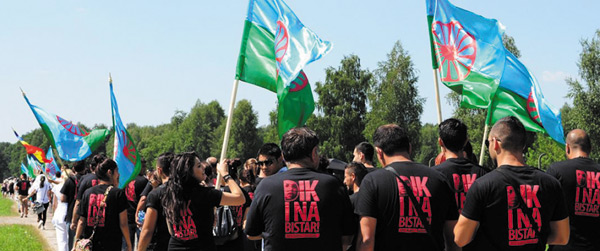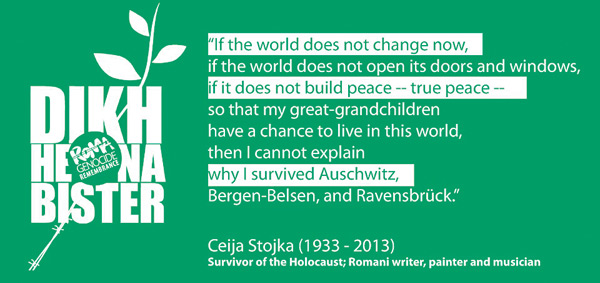Alexandra B wants to take YOU the reader into her history and ask you to consider your views when you discriminate against someone like her and her people – the Roma.
Over the last few years I have had a verbal and moral fight with people who don’t understand that the meaning of one simple word can change the people, and the facts and how you view these people. I am a Roma woman and I would like to bring you my point of view. I want to take YOU the reader into my history and ask YOU to meditate more when YOU discriminate against someone like me and my people – the Roma.
The word “Roma” comes from the Romani language that is an international language and the meaning is “human being”. Roma doesn’t have anything in common with the word “Romania”. We choose this word because we need to receive respect. The words Gipsy, tzigania and tigan mean ‘the people you don’t touch’, or don’t want to touch. In Romanian dictionary the word “tigan” is a person who has anti social manners and is black.
We will begin in 1385 when the first arrivals of the Roma appear in Romania. They became goods and property of many Christian monasteries. This was the start of 500 years of slavery for the Roma. They had no rights and were used like animals.
After we gained “freedom” there was a period of integration into society, until the Nazis identified us as ‘Undesirables’. In August 1944, 14,000 Roma were gassed and incinerated at Auschwitz-Birkenau in one mass action.
And between the summer of 1942 and the spring of 1944, the Antonescu Romanian government deported more than 25,000 Romanian citizens of Roma origin to Transnistria, forcing them to make the journey on foot or in wagons. Approximately 11,000 Roma lost their lives, due to the terrible living conditions, starvation or disease, many of them children and throughout Europe, camps were built for my people to be exterminated.

DIKH HE NA BISTER (organized by ternYpe) mobilizes young Roma and non-Roma to remember the Roma Genocide and to commemorate on 2 August, the Roma Holocaust Memorial Day.
A quick fast forward. The countries across Europe quickly forget the facts from history and the Roma persecution continues to this day.
In the eastern part of Hungary a shocking series of KKK style murders happened to Roma people in 2008. For a long time, the Hungarian authorities showed little enthusiasm in investigating the murders.
In 2010, 76 Roma families were forcibly evicted without adequate notice by the local authorities from Coastei Street in the centre of the city of Cluj-Napoca, in North-Western Romania, and 40 families were moved to the outskirts of the city, near the city rubbish and chemical waste dump. The others were offered no alternative accommodation. No consultation with the affected families took place prior to the eviction and no feasible alternatives to the eviction were explored. Those evicted were not given any written or detailed notification with sufficient notice, nor the opportunity to challenge the eviction decision.
The Roma Walls
Since the fall of the Berlin Wall, new walls have been erected in many countries across Europe. In Slovakia 14 walls were built and still exist to separate Roma from their non-Roma neighbours. Also in Romania, Bulgaria, Czech Republic, Italy, France and other European countries, local governments have built walls to hide the Roma from others – arguing that they are doing this to protect the safety of children.
In fact, many mayors have won votes on an anti-Roma agenda and complying with the anti-Roma requests to prevent the Roma from entering streets that everyone else has access to.
People say the Roma are ill educated, yes it is true, but its no coincidence that in the countries we come from – Slovakia, Czech Republic, Hungary – Roma children are segregated in schools and in many cases sent to ‘Special Schools’, or as we say ‘Container Schools’, where they are completely cut off, not just from their peers, but from almost anybody from the non-Roma population. Thus confining us to our own settlements, separate classrooms and schools and many other separate services continues to compound our isolation.
The majority of Roma people in these segregated areas have no formal employment so have no reason to leave apart from taking their children to school or occasionally visiting doctors. The government in each of these states fully understands that inclusion of the Roma in social and economic life is the solution, but they deliberately choose to exclude people because it suits their political purpose. They can then blame all of society’s ills on us, the Roma people.
I ask you this question: if YOUR children were excluded, like ours, from education, from employment – would you stay around? Would you accept this system in these countries?
Today, here in the UK, we have more choices, we can choose which direction our future will take and we all want a better future for ourselves (if we can) but more so for our children and our families. We the Roma people have not had the time to develop ourselves, because all our efforts have gone into surviving and striving for freedom. After 500 years of slavery, the Holocaust, 45 years under state communism, and then continual discrimination and segregation, at last we feel now we have the freedom to choose our way and for the first time we have real access to education and a health system.
We don’t want to be stereotyped, demonised or to be judged. The non-Roma people also need to be educated and to learn more about our culture and history.
If you have this history and this persecution how would YOU build your future in this country?
A lot of us have chosen to make a new life here in the UK. We have managed to find jobs, our children go to schools without persecution and discrimination. When you are Roma and you hear that in the UK you can give your children a new opportunity, you can find work, people will not judge you, you don’t need to tolerate what your parents accepted, anymore, it does not take much thinking to make that decision and come here.
But the British people think that all the Roma sell is ‘The Big Issue’. Wrong!!! The most visible Roma are the Roma that sell ‘The Big Issue’. Why? Because they are the poor Roma. They dress more traditionally and, because of their lack of basic education, they cannot find anything else to do.
The main barrier is the language. For them selling ‘The Big Issue’ is a job and a responsibility. It is a new start, and an attempt to try and make a new life. The majority here in Liverpool and the UK are the Roma that are invisible. YOU cannot see them, maybe YOU don’t want to see them. Why? Because they are integrating. Some of them have good jobs (after two or three years of struggles) and they pay taxes. They can be your neighbour or your child’s class mate.
The Roma you don’t see start work on low wages on temporary contracts, often organised by gang masters and recruitment agencies. Their vulnerable situation is often exploited. Many live in sub-standard accommodation, shared with other families. After some years they can save some money and they rent a house to stay only with their family.
Hate crimes have increased since Brexit and many think that it is time for us to leave this country. But do you realise that there are Roma families who’ve been living here ten years or more? This is their home now, they have nothing to go back to. They have the ability to change their thinking and to adapt in this country and work for a better future and to develop themselves. The UK is home.
Now what would YOU do? All the progress we have made you cannot delete with one click. We are born struggling and we know how to face our struggles. I believe YOU can find this in our DNA.
We don’t take your jobs because all the jobs were available when we came here. We want to work, be it cleaning, warehouses (all those jobs that YOU don’t like to do) and after, if our children finish their education here in the UK, a new door opens to them.
Push the hate aside and learn more about us, about our beautiful culture and traditions. romafacts.uni-graz.at/index.php/culture/introduction/roma-culture
In Spain flamenco is the heart of Romani culture, it is also a mixture of Indian, Persian, Greek, Moorish, and Arabic elements. youtu.be/P-qC2XnOLVg
We are Roma
 Gabi Lunca is a Romani singer of urban lautareasca music from Romania https://youtu.be/B8Bd_kh_EqU Gabi Lunca is a Romani singer of urban lautareasca music from Romania https://youtu.be/B8Bd_kh_EqU |
 The best singer from Romania is Roma. His name is Connect-R and he is proud that a Roma win the best singer each year. https://youtu.be/3CJ2J0UMEw4 The best singer from Romania is Roma. His name is Connect-R and he is proud that a Roma win the best singer each year. https://youtu.be/3CJ2J0UMEw4 |
 Vicente Rodrigues Fernandes, a Roma from Spain, is one of Forbes Magazine’s Most Influential People under 30. As a human rights activist, cartoonist, screenwriter, and founder of the Roma youth network, YAG-BARi-TERNYPE-International. Vicente Rodrigues Fernandes, a Roma from Spain, is one of Forbes Magazine’s Most Influential People under 30. As a human rights activist, cartoonist, screenwriter, and founder of the Roma youth network, YAG-BARi-TERNYPE-International. |
 Anna Mirga is a Roma activist from Poland, a PhD student at the Autonomous University of Barcelona. Anna Mirga is a Roma activist from Poland, a PhD student at the Autonomous University of Barcelona. |
 Robert Popescu a Roma doctor from Romania https://youtu.be/BjnY2R-ZbGQ Robert Popescu a Roma doctor from Romania https://youtu.be/BjnY2R-ZbGQ |
| There are more young people that have the opportunity to study or to travel and to make there one research and to be a model for their community. This kind of example can be also in the future here in UK. For example: |
 Perla (Roma from Romania), she start her studies in University of Birmingham. Perla (Roma from Romania), she start her studies in University of Birmingham. |
 Aurelia (Roma from Romania) she start to study Law and Practice in Coventry University. Aurelia (Roma from Romania) she start to study Law and Practice in Coventry University. |
Don’t judge if you don’t know us and our history, don’t generalize and put in your front the stereotypes that you know about us. Be human YOU = ME


Permalink
Thanks for sharing this really informative account. Good luck to all Roma people who have come to make their lives in the UK.